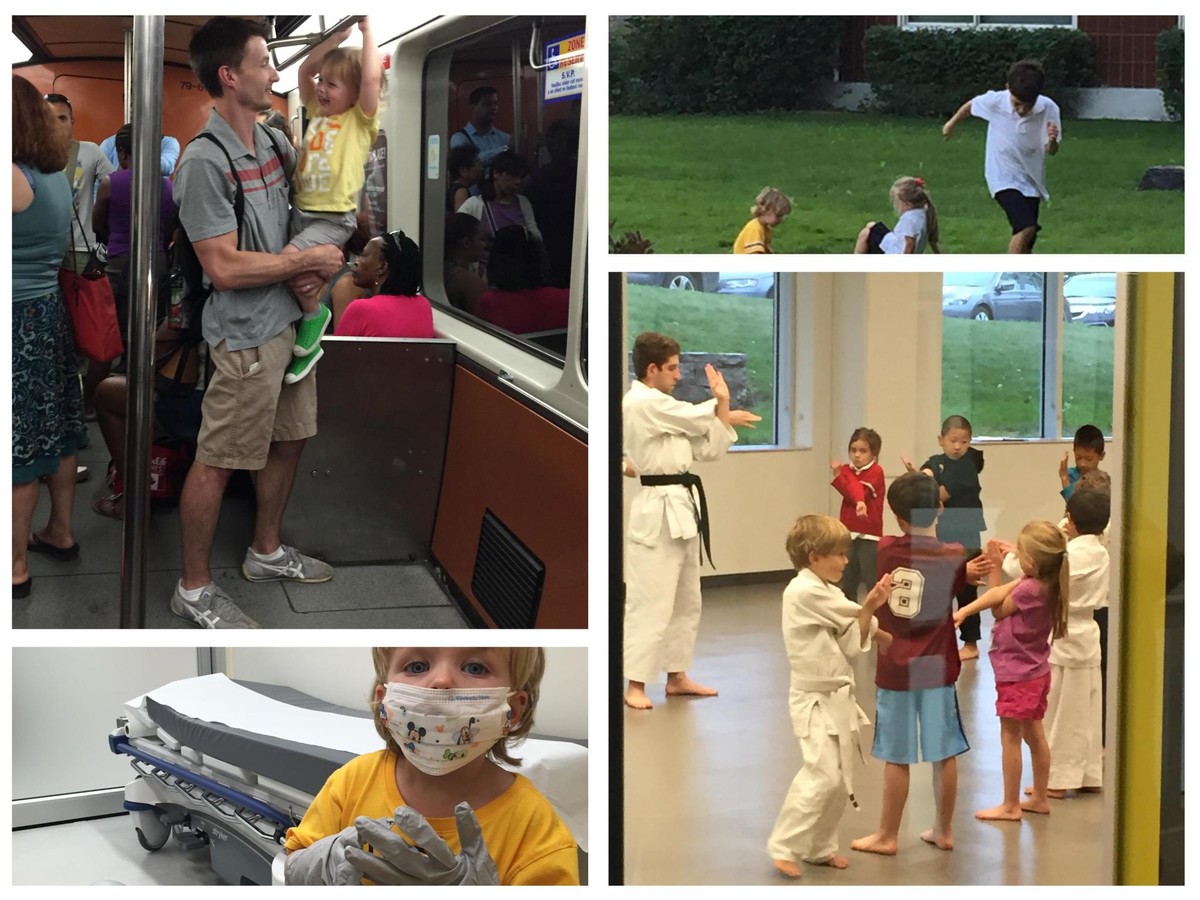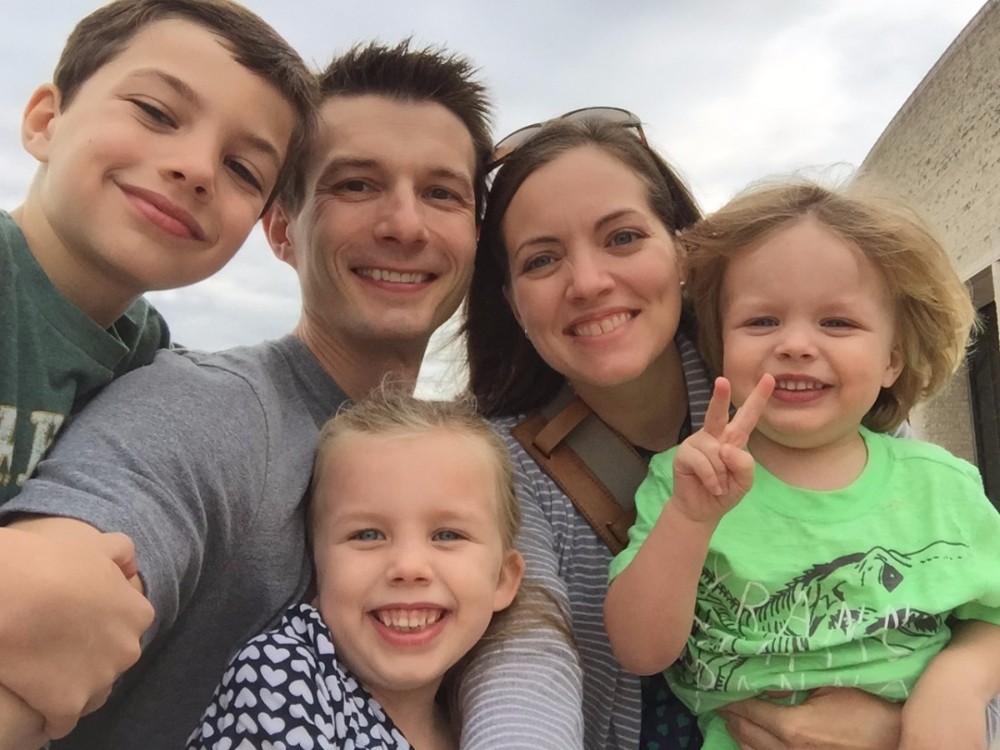In addition to the opportunities being a Fulbright recipient have already given me, living in Montreal has been equally life changing for my young family. As I reflected on what I might write on the occasion of International Education Week, I thought about our experiences together. It would not be possible for me to capture all we’ve learned here. I’ve written about some specific aspects elsewhere, so I thought might draw some parallels between our experiences and Senator’s Fulbright reflections on the importance of international exchange.
In Prospects for the West, Senator Fulbright shared:

If I had to describe our Fulbright family experience in just one word, it would be enrichment. My children (aged 3, 6, and 7) spend their days learning alongside others who look, act, dress, believe, and/or celebrate very differently than they do. Yet, while each has acknowledged and asked questions about some of those differences in their own ways, all of those things have been secondary to simply making new friends. I am reminded of the profound excitement my daughter had after learning about Eid (al-Fitr) from her friends and wanting to make it a new family tradition for us to celebrate as well. Below are some notes she made for each of us.

We have found Montreal is not just a large city in a different country, it is an international metropolis with its own unique culture. I’ve written previously about my astonishment of the bilingualism here. My youngest son is a product of how this is fostered. At his daycare, his teachers speak in both French and English, and many of his friends speak only one language or the other. As a result, he now blends his sentences with French and English words, not recognizing that they are different languages. Two of my favorite examples are the rouge tractor he wanted to ride on his birthday and the pompier sirens he hears when firemen pass, spoken with his developing Tennessee/French Canadian accent.
In a speech to the Council on International Exchange, Senator Fulbright stated:
Educational exchange can turn nations into people, contributing as no other form of communication can to the humanizing of international relations.
The notion of nations becoming people has resonated with my family. Before we left the US, the two oldest were just beginning to understand that we live in a world with physical borders that define nations. What we have learned while here is that it isn’t quite enough just to talk about, read about, or even live somewhere else. To truly exchange with others, you have to be willing to let go of the way things “are” and just let some things “be.”

We love museums and hoped to learn about the history of Montreal by visiting them all over the city. We learned about early culture at the Chateau Ramzey and Notre Dame de Bon Secours, about French, English, and First People influences at the Chateaux National Historic Site site in Quebec City, and about former and current government history at Parliament in Ottawa. My favorite was a temporary exhibit on the impact of snow in Montreal. There, we saw historical and present day images, the role of equipment on keeping the city moving, and in general how people live and adapt with snow. Its not been all academic, however. We also learned about the video game industry in Montreal as well as a bit about the metal scene.

Of course, we have learned a lot from our everyday life experiences - from grocery trips, riding the Metro, extracurricular activities, the occasional hospital visit, and simply interacting with others, we have continued to learn from the city and the people we encounter here. A simple example is our residence - we live in a tall apartment building with mostly older residents. About half of them love having children in the building, about a quarter are somewhat indifferent, and the rest are not so thrilled with the noise three small (and admittedly loud) Americans can make. The children have learned (OK, they are working on learning) the importance of respecting others (not running in the hallway, holding open doors, why quiet time is important) and while I can’t say they are perfect, I think living among others who are different is helping to teach them lessons about being good citizens.

In the forward of The Fulbright Program: A History, Senator Fulbright wrote:
In many ways, I feel like this particular quotation applies most directly to our lives here. In addition to what I related above, two other experiences have greatly impacted us. The first is was learning about Terry Fox. I wrote about that pretty extensively elsewhere. As our children grow up and start looking beyond their immediate circles for role models, I am grateful that they learned a hero is defined by his or her qualities, not by the flag he or she represents.
The second is more directly related to the search for understanding. A significant part of the Quebecois culture is dissent. As a researcher who has studied protest, I have been interested to watch activism enacted here. Some of the major social issues of the past year didn’t hit our home state in the US as visibly as others, so talking about oppression and social problems with the children has been more academic than experiential. Here, the children have been out of school for scheduled strike days related to teacher pay and job security. I believe being in this environment has set the ground work for continued conversations in our house about the importance of preserving the right to question, stand up, and be heard.

Overall, I believe our Fulbright Family experience has given us a chance to focus on family in a way that “regular” life and work might never let us - at least not with the routines we'd developed. Watching how people live and work here has been a powerful lesson. Work begins a little later to allow families to get their children to school, employers seem to be a bit more flexible about days out for school, and in general, children seem to accompany their parents more commonly in coffee shops, stores, and in the city. One of the most touching moments I saw here on the first week of daycare for my youngest was that nearly every ready-for-work parent stayed well past drop off to ensure their children had a happy transition.

We are college football fans. This is a country of hockey fans. Needless to say we’ve found all sorts of creative ways to keep up with our teams on Saturdays. I wish I could say we embraced the hockey culture more than we did, but I think our love for football was just too much.

According to my 7-year old, Montreallers are “crazier about Christmas than the Whos.” He made this observation after seeing Christmas decorations go up the day after Halloween.
My daughter and son have been very confused about money - at their age, they are just learning how to count and make change. People don’t really use pennies in Quebec, and instead round up or down when making change. As you can imagine, this has caused some confusion we’ll have to fix when we get back to the states, where no penny goes uncounted.
Of course, we are also affecting the culture here. My favorite example of this is when my not-in-the-least-bit shy daughter came home from school and told us that because they could not go outside for recess due to rain, she sang several Taylor Swift and Katie Perry songs on stage for all of 1st-3rd grades. There is also a rumor she performed the Whip Nah Nah.
We miss American hamburgers. The beef here is just different. We don’t know which is healthier and don't care. We just all want a giant American hamburger.